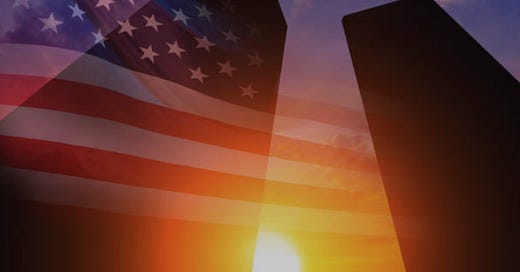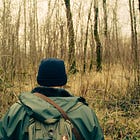First Responders Always Answer The Call, But Nobody Answers Theirs
Psychedelics are the new unwanted frontier of mental health. Unwanted because they have the power to put big pharma and many doctors out of business. You can go through a lifetime of therapy—hell, even three lifetimes of therapy—and never get the relief you need that psychedelic medicine will bring you in one sitting. However,…
Psychedelics are not a panacea. They are not the end-all-be-all and they are not for everyone. Personally, I don’t think they should be moved to schedule III because people aren’t responsible enough to take them, and if they do make it to schedule III, the problem will be the inexperience of doctors prescribing them.
My intent for this article is twofold. First, I want to shed light on something that isn’t new at this point--the efficacy of psychedelic medicine and the failure of the mental healthcare system. But I want to do it from a different angle—a forgotten angle. And that is the unrecognized yet required healing for first responders.
Article Suggestion:
First responders—police, firefighters, EMTs—I believe have a much harder job than we ever did as SEALs. We have the funding. They don’t. We have resources. They don’t. We have a nation that supports us—at least at the surface, because there’s shame if they don’t. First responders do not.
One criterion for PTSD, according to the DSM-5, which is the diagnostic and statistical manual for mental disorders—the bible that health care providers use to diagnose—is recurring memories or flashbacks1. For veterans, it may be loud muffler pops that sound like gunshots, movies, certain smells (if you’ve ever been to a third world country you know what I'm talking about—it’s like a mix of garbage and burnt rubber), or any number of triggers. However, for first responders, it may be a driveway they pass by every single day. It may be an intersection where they pulled a newborn out of a car after her mother was killed, and now the baby must go to foster care. Or maybe the newborn was killed, too. Having to relive those memories on a daily basis—because they live where those memories were created—means that home is their battlefield.
When I signed up to be a SEAL, I knew what I was getting into. I wanted to go to war. I wanted to shoot bad guys and I wanted to carry a gun. I can’t tell you how many toy guns I had as a kid. They 100% defined me. I was not oblivious to what would be asked of me in the Teams.
I’m not so sure first responders are on equal footing. My personal opinion is that some sign up because they want to help people, others because they don’t know what else to do, and still others because it fuels their ego and needs for control. Nothing says power like a badge and a gun, and some people need those sources of validation because they’re justs weak inside.
Anyway, my point is that first responders probably sign up without realizing just how much death and destruction they’ll see, and certainly don’t have the requisite training or coping skills for how to manage what they do. In Dave Grossman’s book On Killing, he cites that only 15 to 20% of combat infantry in WWII were willing to fire their rifles. An estimated 35 to 85 billion axis soldiers died during WWII from only 15 to 20% of allied hands.
How this relates to first responders is interesting. Grossman contended there to be significant psychological costs if there isn’t:
1) Mental preparation for the act of killing
2) Support from one’s leaders or peers for one’s actions
3) If the person (i.e. the “giver”) can’t justify their actions or if nobody else is willing to justify their actions for them
How do you prepare to kill? That’s a complex question, but the first layer of that question is, “What needs to be trained?” The answer is: one’s psychological disposition to killing. One must be willing and able to kill. How do we do that? S.L.A. Marshall, a veteran of WWI, military journalist, and historian, studied the firing rates of soldiers in WWII and found two revealing factors for why the kill rates were so low. First, the hit rate compared to rounds fired was low. Soldiers weren’t hitting their targets but they were firing their riffles—because they weren’t aiming at their targets. It was too much for them to even look at another human being through their sites let alone pull the trigger. They weren’t able to kill because they weren’t willing to entertain the thought of it. So, training was revamped. Instead of firing at bull’s-eye targets, new silhouette targets that resembled a human outlines were emplaced. Shotting distances changed from 300 yds to intervals of 20 to 300 yards. Soldiers began to internalize the prospect of killing as up close and personal, turning hit rates into an (almost) automatic reaction instead of a slow, deliberate, conscious effort of having to navigate a mental spider web of ethical and moral dilemmas.
Another important factor to consider is camaraderie. In the military, camaraderie is a lifeline to sanity because it keeps you connected. In war, you pull the trigger to protect not only yourself but also your teammates and any innocent people the bad guys (or women) on the other end of the rifle were intending to harm. It’s not just about you out there. Killing the bad guys does more good than harm because it protects the guy next to you.
"If those who are sent to draw water begin by drinking themselves, the army is suffering from thirst.” – Sun Tzu
To Grossman’s second point, without peers, without teammates, without a network of social support, the human desire for connection is relegated to isolation, and that’s where the real darkness lies. The thing is, in the firehouse there’s lots of camaraderie. They eat together, live together when on duty, sleep in the same bunkroom together. Everything firefighters do is together.
Police don’t have that. Many police are lone wolves, out there on the beat alone without a partner. They have nobody “with” them and they have nobody “above” them because politics and backstabbing run amuck in law enforcement. There is no “team” in police departments, only “me.”
This “screw everybody else but me” mindset has consequences. Police officers report with depression at double the rate of the general population (12% compared to 6.8%). They are five times more likely to present with PTSD. They are more likely to kill themselves than be killed in the line of duty and nearly all experience burnout at some point in their careers. Then there’s the night work that impacts their sleep cycles which consequently throws their hormones—specifically, testosterone—out of wack. There’s the emotional exhaustion of just dealing with negative emotions all day—both theirs and other people’s—not to mention the American public’s negative stigma of law enforcement and how police are somehow the “bad guys,” and the general lack of mental health support in their departments.
This is not okay.
This article series will share the stories of anonymous first responders and veterans who decided to undergo psychedelic therapy because their country has failed them. The very men and women who are out there every day protecting us aren’t equipped with the resources they need to protect them.
This is not okay.
If you’d like to support first responders with alternative healing modalities, please visit https://thesirenproject.org/
And if you’d like to stay informed about the next article, please consider subscribing.
1The diagnosis criteria for PTSD is, in my opinion, flawed. However, this is the criteria to which we (health providers) must adhere.






